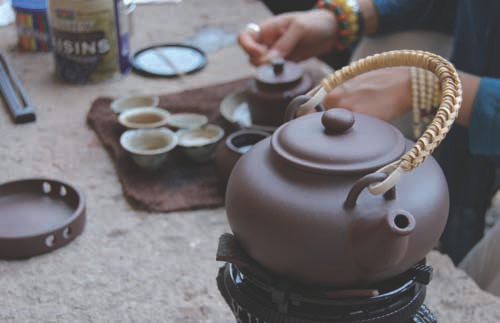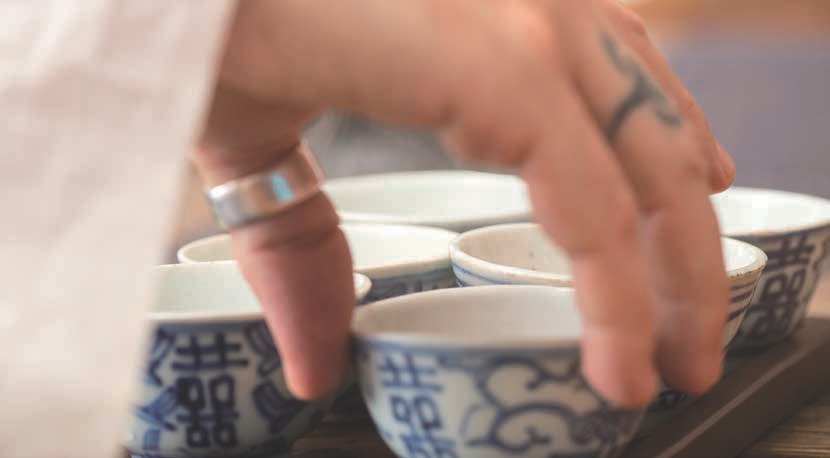
 |
|

Preserve the heat and being to absorb peace. With slow, gentle and graceful movements, And a heart free of obstructions, Everything is finished in one breath.
We'd like to continue our discussion of the poem that inspires our gongfu tea brewing in this tradition. There is much more depth than we can possibly explore in these articles, even if this series went on for years. But so much of gongfu tea is in the hands and heart, where the best tea always comes from. You can't really understand the poem until you experience the Tea this way. Knowing something is never the same as feeling it. As Master Lin always says, "the proof is in the cup." We therefore encourage you to read more deeply into this poem, and more importantly apply it to the way you prepare gongfu tea— instilling the mastery into your heart so that you feel it in your hands when the time comes to do so.
This month, we turn to the third line, which is perhaps the most important of the whole poem: "with a heart free of obstructions." This is the only line in the poem to have its own historicity. It comes from the Mahaprajnaparamita Hridaya Sutra, known as the "Heart Sutra" in English. In that profound teaching, this line is often translated as "the bodhisattva lives without walls of the mind, and thus without fears..." The "without walls of the mind" part is the "heart free of obstructions" part of our poem. It is one of the deeper points of an already deep sutra, demonstrating that the warrior or being (satva) of enlightenment (bodhi) lives without any barriers of the mind/heart, which is only one word in Chinese (shin). Without any barriers, she is fearless—committed to the liberation of herself and her world at all costs and willing to enter the very gates of Hell itself to save those within. But that is a very high state, indeed.
Sometimes Master Lin replaces this line with a tamer one, "xīn wú bié xiàng (心無別向)", expressing the same truth with less depth or profundity, and much less historical weight. But the Buddhist version says so much more about what it means to brew tea with skill, alluding to the ancient Chinese concept of doing without a doer, acting without an actor—essentially flowing with the activity so that it is doing itself—the way an athlete loses herself in "the zone" or a musician becomes so completely enraptured in the performance that he no longer exists. This state is known as "wu wei".
In the West, there is often a misunderstanding that mastery is about control. For that reason, Western students are often reluctant to call their teacher "master"; and who could blame them when the word has been used so pejoratively throughout history: to refer to the owner of slaves or dogs, etc. But true mastery is never about control. Mastery is about finding the part of you that meets the Universe and acting from there. In that way, you have the power of the world behind you, in all that you do. Your actions then flow with the current, and there becomes a very real sense in which your power and breadth is magnified manifold. You move and create with the energy of the world itself, in a way doing its bidding—though that is only a turn of the pen or a way of speaking. Wu wei is as a dancer says that when she performs there is no music and no her, only dance. Wu wei is when you are such a natural part of the flow of Tea that you belong in the process as much as the teaware or even the Tea...
As we discussed last month, one of the most important basics of Tea is to learn to never, ever pick up the kettle until your heart is clear. There is a tradition dating back hundreds of years in China that one shouldn't talk while pouring the tea, lest the words pollute the tea liquor. The pours have always been opportunities for pauses, even in business meetings or casual conversations over tea. In that way, both the host and the guest gather themselves and reflect on the discussion, weighing their responses properly. Then we speak from the heart, and we learn the art of listening well.
There is no more important advice than to take the time to center yourself before you start each brew. Clear your heart and mind. This could happen through meditation, breathing, a prayer or my favorite, which is to connect the kettle to the pot—with one in each hand—while breathing deeply to calm the mind and center one's energy in the heart. As I do this, I can feel when the connection between the water and Tea is clear, through my heart. When the line is clear and the connection is strong and without any interference or static—only then do I raise the kettle. This requires some patience. But remember that there is no hurry. Tea is always about slowing down! There is never any reason to rush, and nothing good will come from it (and talking while you pour, whether outside or in the form of internal dialogue, also results in more broken teaware over time). If you are to prepare tea masterfully, it must be from the place in you that meets the Universe.
When you are resting deep and centered, the tea brewing happens all its own—in a wu wei, to use a pun... Therefore, the more you cultivate yourself, through meditation and other practices, the better tea you'll make. Tea brewing is not something you do, in other words, but rather something you are...
This month, try to make a greater effort to take a pause before each brew to clear your heart. Live without walls of the mind for a second and put yourself into the tea brewing process, as opposed to standing outside and "doing" it. Connect the kettle's handle to the button of your pot and see if you can feel the flow of energy and communication between the tea and the water/heat. It will be easier to feel after the first steeping, as they have already met—there is water in the leaves and pot, in other words. See if you can recognize when the connection is not clear—when it is bumpy/static as opposed to a smooth flow. What happens when you brew tea with your mind? If you find clarity within and pour from there, how is the tea different? What is the difference in the preparation itself? Where do the guiding principles come from when you aren't there? When there is no sense of 'I' as subject who is 'preparing tea' as verb, who/what is preparing the tea? Where do the movements come out of and where do they go when they are done?

We hope that these questions will not only help you explore your gongfu preparation more, but that they will also shed some light on this poem—so central to our tradition—and help pave the road for some greater transformations in your tea practice and life...
